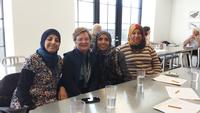Edible Alphabet: Learning English and Connecting to Culture Through Cooking
By Liz A.Edible Alphabet is an English-as-a-Second-Language program offered by the Free Library's Culinary Literacy Center. The mission is twofold: to teach participants how to cook nutritious meals and to teach English language skills through hands-on education.
Food is universal—it cuts across cultural differences, uniting people in all walks of life. Our program accounts for differences in learning styles, nutritional and consumer practices, and classroom expectations among English language learners.
About Edible Alphabet:
Edible Alphabet is a six-week series that provides a meaningful and enriching classroom experience. We are partnering with the Nationalities Service Center (NSC), a non-profit organization that has provided social, educational, and legal services to immigrants and refugees in the Greater Philadelphia area since 1921. Students from NSC are from a wide array of countries of origin and have a range of English language skills. Edible Alphabet complements the students' existing classes at Nationalities Service Center.
Our classes are taught by both a certified ESL instructor and a chef to maximize the building of nutrition education, language skills, and consumer literacy simultaneously. The curriculum helps students identify ingredients, kitchen tools, and cooking implements in English and how to categorize ingredients according to their food groups; teaches common cooking verbs and food adjectives; and leads students through preparing and cooking recipes. The class also gives students the opportunity to share conversation in an informal, familiar setting: around a table, at a shared meal.
Here’s what the staff at Nationalities Service Center had to say about our first six-week class:
“While occasionally interactions in the U.S. are unfamiliar and stressful to clients, cooking serves as a reminder that many things remain the same and that they possess the tools necessary to survive here. Cooking class therefore serves as a comfort to our clients as well as an educational tool.”
– Bridget
“Once the cooking began, those students who normally feel uncomfortable in a classroom fully participated in the lesson. Many students with less English fluency, who often hang back in English class, demonstrated their expertise in cooking without hesitancy or self-consciousness. …This was a wonderful break from the usual routine that engaged students on many levels and taught useful skills relating to language, teamwork, nutrition, and conversation.”
– Rachel
Have a question for Free Library staff? Please submit it to our Ask a Librarian page and receive a response within two business days.

